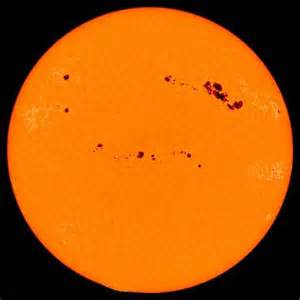This is Scientific American 60 Secomds, Space. I'm Clara Moskowitz, got a minute?
这里是科学美国人60秒,太空系列。我是克拉拉·莫斯科维兹。
Every 11 years, the sun's magnetic activity ramps up, sometimes to a frenzy, causing large Right now we should be in the middle of such a solar maximum. But we've yet to see the expected level of activity. In fact, this latest solar max has been a bit of a dud.
太阳活动由太阳大气中的电磁过程引起,时强时弱,平均以11年为周期,活动剧烈期的太阳活动有太阳黑子和耀斑。而现在我们本应该处于一个太阳活动极大期。但太阳活动并没有我们预期的那样强烈。甚至于以往的太阳活动极大期相比逊色不少。

"Compared to say the five or six previous cycles, this is really weak." That's astronomer Sarbani Basu of Yale University, at the 224th meeting of the American Astronomical Society in Boston on June 3rd.
“与之前的五六次太阳活动周期相比,这一次势头太弱了”,这是耶鲁大学的天文学家塞巴尼·巴苏在于本月3日波斯顿举行的第24届美国天文学会上作出的评论。
"And then when we went back and started comparing with whatever little data we had of the previous cycles, we realized it may not be that peculiar after all."
“但我们回头看一看以往仅有的一些数据就会发现,此次的太阳活动也并没有那么不同寻常。”
We don't really know yet whether the current cycle is the oddball, or if previous cycles were unusually strong. Ground-based telescopes started closely monitoring solar activity only around 60 years ago. And high-quality space-based observations go back just a decade—not even a full solar cycle.
其实我们并不能确定这次太阳活动是不是真的不够强烈,也不能确定以往的活动又是否真的那么强烈。因为,地面望远镜开始用于观测太阳活动也不够是60年前的事,而高质量的天基望远镜更是只有短短十年的“工作经验”,连一个太阳周期的时间都不到。
So astronomers are eagerly awaiting what the future can tell us. "It's going to be fun the next few years,I'm looking forward to it."
现在科学家们都在翘首以待,看看未来又会发生什么。“几年以后以后也许我们会得出有趣的结论,我真的很期待。”
Thanks for the minute for Scientific American 60 Secomds, Tech. I'm Clara Moskowitz.
感谢收听。












